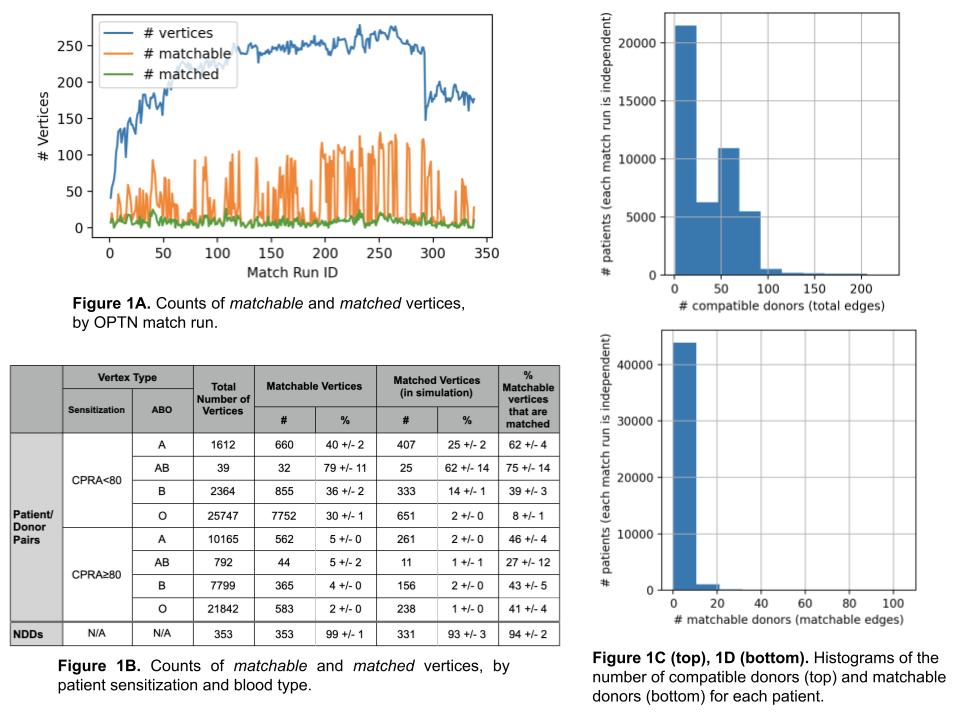Who Can be Matched via Kidney Exchange?
1Applied Mathematics, University of Maryland, College Park, MD, 2Computer Science, University of Maryland, College Park, MD, 3United Network for Organ Sharing, Seattle, WA, 4UNOS, Seattle, WA, 5Computer Science, Carnegie Mellon University, Pittsburgh, PA
Meeting: 2021 American Transplant Congress
Abstract number: LB 79
Keywords: Kidney transplantation
Topic: Clinical Science » Kidney » Kidney Paired Exchange
Session Information
Session Name: Kidney Paired Exchange
Session Type: Poster Abstract
Session Date & Time: None. Available on demand.
Location: Virtual
*Purpose: Valuable time and resources are spent screening medically-compatible patients and donors for kidney exchange. Exchanges with tens or hundreds of patients can have thousands of medically-compatible transplants between participating patients and donors. However, only a small number of these transplants can participate in the cyclical or chain-like swaps required by exchange. For example, a patient may have many medically-compatible donors, but cannot join with other patients/donors to form a cycle or chain; this patient is not matchable in the exchange. Exchanges can save valuable resources by focusing on matchable patients, donors, and transplants.
*Methods: We study 321 exchanges from the US Organ Procurement and Transplantation Network (OPTN) from 2010-2018. We refer to patient-donor pairs and NDDs as “vertices”: we count the number of matchable vertices, which is a fraction of those with compatible transplants. We also distinguish by patient blood type and sensitization. For each patient, we count the number of compatible donors and matchable donors. Finally, we simulate a match run according to OPTN policy, and count how many vertices and transplants are matched (they would receive a match offer in the exchange).
*Results: Most exchanges have over 150 vertices, and about a third of these are matchable. Fig.1A shows the total number of vertices, matchable vertices, and matched vertices (in simulation). Fig.1B shows these numbers by patient sensitization level and ABO. Less than 5% of all highly sensitized patients are matchable, though a large fraction of these are matched by OPTN policy. Most patients have many compatible donors (median=29), but 70% of patients are not matchable. Fig.1C shows a histogram of the number of compatible donors per patient, and Fig.1D shows the number of matchable donors per patient. Among matchable patients, the median number of matchable donors is 3.
*Conclusions: Kidney exchanges with hundreds of patients and donors can have thousands of potential transplants, but only a small fraction of these can be matched through cycle- or chain-like swaps. We find that most patients (70%) are not matchable: they cannot participate in exchange. Furthermore, those who are matchable have a small number of matchable donors (median=3). Exchanges can focus their limited resources on matchable patients, donors, and transplants, since all others cannot participate in exchange.
To cite this abstract in AMA style:
McElfresh DC, Curry M, Booker SE, Stewart D, Stuart M, Leishman R, Sandholm T, Dickerson J. Who Can be Matched via Kidney Exchange? [abstract]. Am J Transplant. 2021; 21 (suppl 3). https://atcmeetingabstracts.com/abstract/who-can-be-matched-via-kidney-exchange/. Accessed January 24, 2026.« Back to 2021 American Transplant Congress

